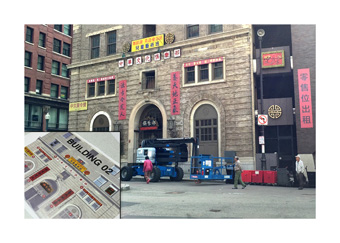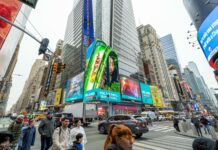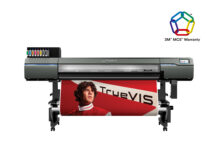Ghostbusters—a 2016 reboot of the classic 1984 supernatural action/comedy film—is set to open nationwide this Friday, July 15. In the new version, an all-female ghost-busting team (Melissa McCarthy, Kristin Wiig, Kate McKinnon, and Leslie Jones) take on a massive number of slimy ghosts and ghouls threatening to take over New York City. In addition to all the CGI movie magic needed to bring these creepy characters to life, making the sets look real was a monumental task. To help bring the set to life, the film’s producers called on graphic designer Martin Charles.
Using his considerable talents and his Roland wide format printer, Charles gave an authentic look to everything from faux building walls and surface textures to the street signs, labels and bottles in the Ghostbusters’ lab.
Charles, the founder of Santa Monica-based SagaBoy Productions, is no stranger to Hollywood circles. He has helped design and create realistic sets for more than fifty feature films and television productions, including movies such as 42, Public Enemies, Love and Other Drugs, Charlie Wilson’s War, and the HBO hit series The Newsroom.
However producing the wide variety of detailed sets for Ghostbusters, which ranged from mid-town hotels to Times Square to haunted mansions, definitely required the best his skills and equipment had to offer.
“Rebooting this legendary movie franchise was a great opportunity and an intriguing challenge,” said Charles. “We needed to preserve all the familiar graphic elements while bringing in a few modern twists.”
 Charles worked closely with Production Designer Jefferson Sage to create all of the different settings needed for the film. Recreating the bustling New York City streets required designing and producing commercial signage, wall wraps, street signs and posters, as well as the wraps needed to transform ordinary vehicles into NYC taxi cabs, NYPD cruisers and EMS emergency vehicles. For the film’s interior shots, he produced posters, signs, labels, wallpaper, and wraps that simulated marble and other surfaces.
Charles worked closely with Production Designer Jefferson Sage to create all of the different settings needed for the film. Recreating the bustling New York City streets required designing and producing commercial signage, wall wraps, street signs and posters, as well as the wraps needed to transform ordinary vehicles into NYC taxi cabs, NYPD cruisers and EMS emergency vehicles. For the film’s interior shots, he produced posters, signs, labels, wallpaper, and wraps that simulated marble and other surfaces.
“It all translated into an incredible amount of work,” noted Charles, “Fortunately, my Roland inkjets allowed me to print just about anything you can imagine on the set quickly and easily. That was crucial in meeting the tight deadlines dictated by the Ghostbusters shooting schedule.
“I also relied on the help of two additional graphic experts—Stephanie Charbonneau and Kelly Hemenway—to get the job done.”
 To produce the full range of graphics needed for the film, Charles employed a sixty-four-inch Roland SOLJET® Pro 4 XR-640 large-format color printer/cutter and Roland Eco-Sol MAX® 2 inks. “Having a product like the Roland, which can handle all of our graphics needs, is a huge plus,” he said. “In addition to providing stellar quality production, the XR-640 has built-in printing and contour cutting capability, so with one machine, we can do it all. The Eco-Sol MAX 2 inks helped ensure outstanding results as well, allowing us to hit the color mark every time and achieve fine close-up details, which were often required for Ghostbusters.”
To produce the full range of graphics needed for the film, Charles employed a sixty-four-inch Roland SOLJET® Pro 4 XR-640 large-format color printer/cutter and Roland Eco-Sol MAX® 2 inks. “Having a product like the Roland, which can handle all of our graphics needs, is a huge plus,” he said. “In addition to providing stellar quality production, the XR-640 has built-in printing and contour cutting capability, so with one machine, we can do it all. The Eco-Sol MAX 2 inks helped ensure outstanding results as well, allowing us to hit the color mark every time and achieve fine close-up details, which were often required for Ghostbusters.”
For scenes that included a re-created Times Square and simulated rock concert, Charles produced photo images, backlit signage and images, billboard banners, and a variety of smaller signs. This output was printed on a range of materials, including artist canvas, varying weights of vinyl media, photo paper, poster paper, and adhesive fabric. To set the backdrop for one interior scene, Charles even needed to produce over 3,000 square feet of printed wallpaper graphics.
In total, Charles worked for close to eight months on Ghostbusters, including a four-month shoot. When designing each set, Charles worked backwards from the shoot date, allotting time for the appropriate approvals from the designer and director.
“I wouldn’t do any movie without my Roland,” Charles stated. “Getting a ‘thank you’ from the director and a personal e-mail from the producer saying ‘See you on my next movie,’ is proof of satisfaction. Everyone was quite happy, and I think the viewers will be too!”
To learn more about Roland DGA, or the complete Roland product lineup, visit www.rolanddga.com.











